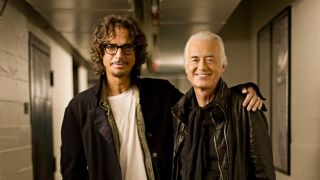As we all know, Jimmy Page has been clearing out the vaults. Since it roared to life last summer, Led Zeppelin’s reissue campaign has continued, with six studio albums remastered and ransacked for lost treasure. Today, the 71-year-old guitarist has broken cover, ensconced at Kensington’s Gore Hotel to promote the rocket-fuelled Physical Graffiti. Yet as our interview goes on, talk of past glories strays into future plans – and in particular, he addresses one tantalising rumour that could overshadow Page/Plant reunion talk if it comes to fruition.
Physical Graffiti deserves excavation. Reissued by Warners on February 23, in six formats from double CD to deluxe box set, and reviewed last month, the 1975 double-album, now thumpingly remastered and resplendent in a replica of the original LP sleeve, is perhaps the peak of the Zep catalogue. “If you have a download, you don’t get the artwork with it,” Page reasons. “And I think that’s why people have enjoyed and elevated towards these boxes we’ve been doing. People have said to me that they prefer the tactile object.”
On the day we meet, Page is looking forward to a seismic playback at Olympic Studios: the same west London facility where Graffiti was mixed in 1974. (“It’s the loudest any of us will get to hear it,” he notes. “Me included.”)
And if ever there was an album that warranted being heard in full, at top volume, it’s Graffiti. “It’s an homage to everything,” he reflects, of the breadth of material. “Led Zeppelin were a band steeped in roots. Every one of us had been researchers into music. It was almost like we’d all had a university degree in it. So when we came together, there are these elements where you hear a rockabilly hook here, or a jazz bit here, or Chicago blues over here, or a bit of Elvis Presley there. It’s too corny to call it a melting pot, but it’s like a fusion.”
Four decades on, Page has vivid memories of the album’s genesis at Headley Grange in 1974. “That’s when I started going through some of the things I had. I had Kashmir, the idea of this intense riff that goes round in a sort of circle. And then with these cascading brass parts over it, so the whole intensity was just going to sort of glue people to the wall.
“I had Sick Again and Ten Years Gone… There was material coming up on the spot, like Trampled Under Foot. To have just a little guitar vignette [Bron-Y-Aur], I thought was really cool. And then to have the things that go into the intensity of Kashmir or In The Light – things which were really coming at extreme tangents – and The Wanton Song and the urgency of that. The sort of tipping your hat to the blues [with Custard Pie].
“And I’ll tell you,” Page adds, “that during the rehearsal process for this, as we had a few albums under our belt, if we’d have been playing something and it sounded like something we’d done before, there was no question about it – it was eliminated and we’d go on to something else.”
As for Plant’s lyrics, Page chuckles at the notion that songs like Custard Pie and The Wanton Song represent Zeppelin at their most explicit. “I think that the music was very sexual anyway. Right from the first album, it’s really, really sexy music. And fortunately that’s something that didn’t go, that was something that was part of it. It could be really raw and it could be hard-hitting, or it could still have an intensity to it, but could be so withdrawn and just touching you and caressing you with sensitivity.”
It’s unthinkable that any serious rock fan doesn’t already own Graffiti in some format. For them, the draw of the reissue is the seven bonus tracks, of which the pick is an eerie prototype of In The Light. “It’s good to be able to include these things in the package,” says Page, “so that you can hear how something like In The Light grows from its early stages. And Sick Again, the original, where there’s just myself and John Bonham, and I think I overdubbed the bass on it. You can hear the urgency of this damn thing.”
Graffiti still resonates in modern times, but with Plant apparently no closer to a reunion volte-face it’s likely the writing is on the wall for Zeppelin. Page, however, may have other irons in the fire. Last November he took part in a live Q&A at LA’s Ace Hotel with Soundgarden frontman Chris Cornell (pictured below), in which he hinted that a collaboration and tour might be on the cards. While he’s evasive, Page isn’t denying it.
“Well, I don’t mean to be glib,” he says when asked outright, “but I’m playing the guitar. The first thing I’ve got to do is find time to play the guitar. So…”
Finally?
“Well it’s not finally, I’ve been playing guitar all the way through. Doesn’t matter what I’m doing at home, does it? That doesn’t interest people. Or even me, in a way. I want to make sure it manifests into playing out there, live, with a project. So will I be out there playing by the end of the year? Yeah, of course I will – but I got to get in shape first.”


